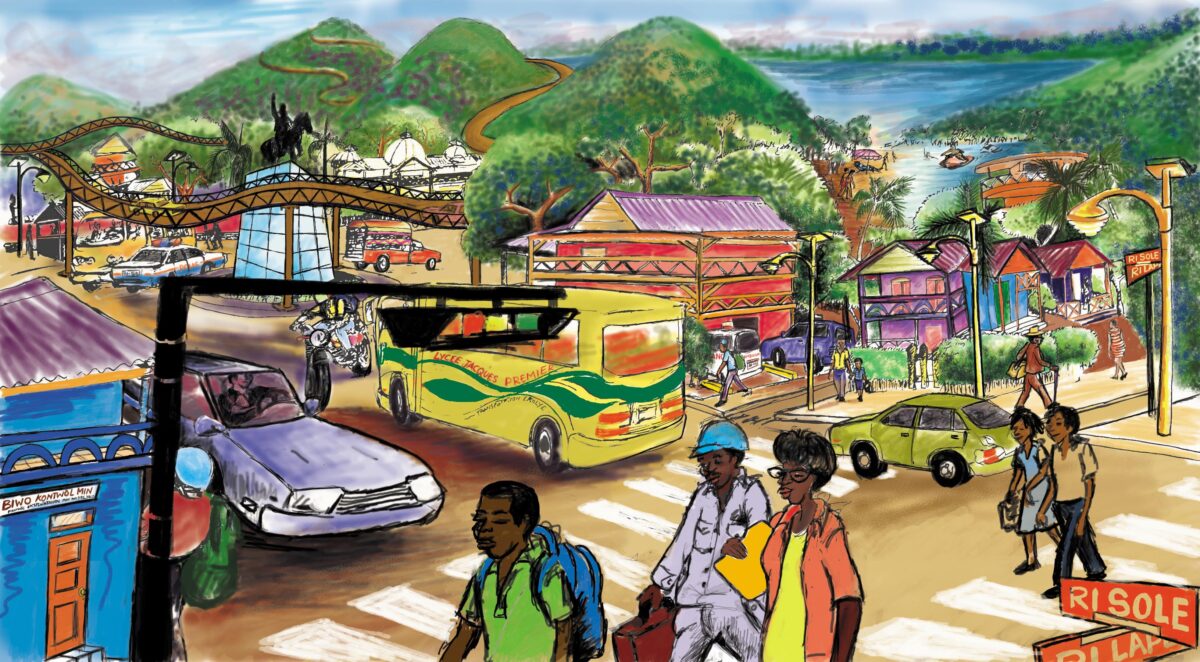HUMAN RIGHTS MOVEMENT | INEQUALITIES
Mining Justice and Self-Determination
The Global Justice Clinic has a long history of solidarity with Haitian social justice and civil society organizations. Our most recent collaboration—focused on rights threatened by Haiti’s nascent gold mining industry—started in 2013 with Kolektif Jistis Min (Justice in Mining Collective), a platform of Haitian social movement organizations, to build the power of communities affected by mining and to hold international actors who are promoting the industry to account.
Our work in Haiti is about rejecting extractivism—in foreign policy, in development, and, importantly, in research methods. In the past few years the Clinic has increasingly done public-facing and closed-door political solidarity work to support the movement for democracy and justice in Haiti. Through long-term partnerships, the Clinic aims to support communities, social movements, and Haitian organizations in their pursuits of self-determination.
American and Canadian companies hold mining permits in Haiti, and international financial institutions have encouraged the development of the mining sector. The Global Justice Clinic works in solidarity with communities in Haiti who are resisting—and saying NO to mining.
- At the end of 2015, the Clinic published a report, Byen Konte, Mal Kalkile: Human Rights and Environmental Risks of Gold Mining in Haiti, that presents communities’ experiences with gold exploration, and rights violations to date.
- In partnership with communities that sit within mining permits, the Clinic filed a complaint before the Inspection Panel of the World Bank about the Bank’s effort to pass new mining legislation in Haiti.
- The Clinic has also engaged UN mechanisms and held a hearing on the right to information before the Inter-American Commission on Human Rights.
The Global Justice Clinic, Kolektif Jistis Min, and community organizations collect evidence and generate data to promote community interests. With the support of scientists, the Clinic conducted a participatory baseline study on the right to water in communities that sit within a mining permit in the North of Haiti. To our knowledge, this is the first time that community members have held baseline data on water conditions prior to the construction of a mine anywhere in the world.
The Clinic is working with community members and coalition of organizations fighting land grabs to:
- use the data in advocacy to resist the construction of a mine in the area.
- explore how community map-making may support their right to land.
- The Global Justice Clinic collaborates with partners in Haiti to create popular education and legal empowerment materials about the potential impacts of gold mining and the human rights protections relevant to those risks.
- Ayiti Kanpe Min — Mining Free Haiti Campaign Website is a home to popular education materials, and a resource for organizers and community members in Haiti.
- The Clinic has also helped to facilitate a number of exchanges with other mining-affected communities in the Global South.
The Global Justice Clinic partners have been targeted for their activism as human rights defenders. The Clinic:
- works closely with Haitian colleagues to bring international attention to their cases—when colleagues believe that such attention operates to protect them—and to accompany them in seeking financial support that will enable them to better protect themselves.
- engages with the Inter-American Commission on Human Rights and the UN in efforts to demand that the Government of Haiti protects human rights defenders.
- The Global Justice Clinic amplifies messages from human rights and social justice organizations in Haiti, and demands the U.S. government, UN, and other international actors to listen to Haitian civil society.
- To encourage more just and informed policies towards Haiti, Clinic staff testify before Congress, participate in high level political meetings, speak on the radio, conduct training, and release statements of solidarity.
Through Rights without Borders, the Clinic works to advance the rights of Haitians outside of Haiti: Haitian immigrants. Impacted by anti-Black racism, xenophobia and language barriers, Haitian immigrants are marginalized in destination countries throughout the Western Hemisphere.
- The Clinic partners with immigrant rights’ organizations supporting Haitians to expose injustices and combat marginalization.
- In 2017, this published report argued for an extension of Temporary Protected Status (TPS) for Haiti.
- Clinic staff have contributed to the legal efforts to preserve TPS for Haiti, participated in the successful advocacy effort to encourage the Biden administration to redesignate Haiti for TPS, and conducted training for attorneys to better serve members of the Haitian community as they apply and reapply for TPS.
- In 2020, the Clinic partnered with Haitian Bridge Alliance, the Institute for Justice and Democracy in Haiti, and Fried Frank, Harris, Shriver & Jacobson LLP, to prepare FOIA requests to divulge records related to continued U.S. deportations to Haiti during the COVID-19 pandemic.
The Global Justice Clinic is committed to shedding light on state-sanctioned abuses and mistreatment of Haitian immigrants in the United States and throughout the hemisphere.



